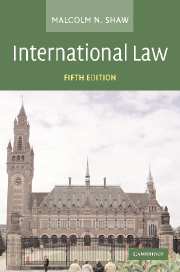Book contents
- Frontmatter
- Contents
- Preface
- Table of cases
- Table of treaties and selected other international instruments
- List of abbreviations
- 1 The nature and development of international law
- 2 International law today
- 3 Sources
- 4 International law and municipal law
- 5 The subjects of international law
- 6 The international protection of human rights
- 7 The regional protection of human rights
- 8 Recognition
- 9 Territory
- 10 Air law and space law
- 11 The law of the sea
- 12 Jurisdiction
- 13 Immunities from jurisdiction
- 14 State responsibility
- 15 International environmental law
- 16 The law of treaties
- 17 State succession
- 18 The settlement of disputes by peaceful means
- 19 Inter-state courts and tribunals
- 20 International law and the use of force by states
- 21 International humanitarian law
- 22 The United Nations
- 23 International institutions
- Some useful international law websites
- Index
- References
10 - Air law and space law
- Frontmatter
- Contents
- Preface
- Table of cases
- Table of treaties and selected other international instruments
- List of abbreviations
- 1 The nature and development of international law
- 2 International law today
- 3 Sources
- 4 International law and municipal law
- 5 The subjects of international law
- 6 The international protection of human rights
- 7 The regional protection of human rights
- 8 Recognition
- 9 Territory
- 10 Air law and space law
- 11 The law of the sea
- 12 Jurisdiction
- 13 Immunities from jurisdiction
- 14 State responsibility
- 15 International environmental law
- 16 The law of treaties
- 17 State succession
- 18 The settlement of disputes by peaceful means
- 19 Inter-state courts and tribunals
- 20 International law and the use of force by states
- 21 International humanitarian law
- 22 The United Nations
- 23 International institutions
- Some useful international law websites
- Index
- References
Summary
Air law
Theories
There were a variety of theories prior to the First World War with regard to the status of the airspace above states and territorial waters. One view was that the airspace was entirely free, another that there was, upon an analogy with the territorial sea, a band of ‘territorial air’ appertaining to the state followed by a higher free zone, a third approach was that all the airspace above a state was entirely within its sovereignty, while a fourth view modified the third approach by positing a right of innocent passage through the air space for foreign civil aircraft. There was a particular antagonism between the French theory of freedom of the air and the British theory of state sovereignty, although all agreed that the airspace above the high seas and terrae nullius was free and open to all.
However, the outbreak of the First World War, with its recognition of the security implications of use of the air, changed this.
The approach that then prevailed, with little dissension, was based upon the extension of state sovereignty upwards into airspace. This was acceptable both from the defence point of view and in the light of evolving state practice regulating flights over national territory. It was reflected in the 1919 Paris Convention for the Regulation of Aerial Navigation, which recognised the full sovereignty of states over the airspace above their land and territorial sea.
- Type
- Chapter
- Information
- International Law , pp. 463 - 489Publisher: Cambridge University PressPrint publication year: 2003



